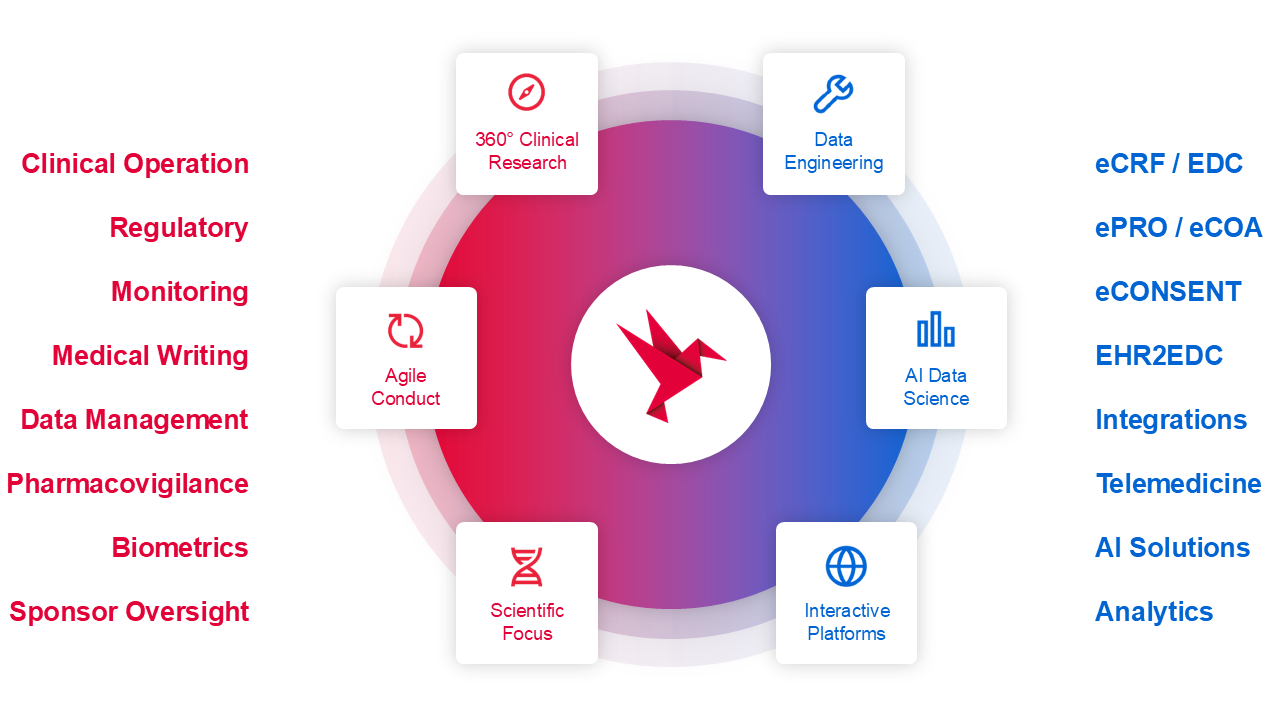What does a Contract Research Organization (CRO) do?
Created: 03.02.2022
Contract Research Organizations (CROs) play a critical role in modern clinical research by helping pharmaceutical and biotechnology companies conduct trials. How can CROs continue to drive progress in clinical research?
What is a Contract Research Organization?
A Contract Research Organization is a company that provides services to the pharmaceutical, biotechnology and medical industries. CROs help companies conduct clinical trials by providing the expertise and resources needed to plan, conduct and evaluate research projects. This includes various phases of clinical research, from early Phase I through to drug approval. Originally created in the 1970s in response to the increasing complexity of clinical trials, CROs have rapidly become indispensable partners for companies seeking to develop new therapies.
What does a Contract Research Organization do?
CROs offer a wide range of services to support the planning, conduct and evaluation of clinical trials. These services include the following:
-
Study planning and design: Developing protocols and strategic plans for clinical trials such as selecting appropriate sites.
-
Patient recruitment: Identification and recruitment of suitable participants for studies.
-
Data management**: Collection and analysis of large amounts of data through the use of electronic Case Report Forms (eCRFs) and quality management systems.
-
Regulatory support**: Assistance with regulatory compliance and regulatory filings.
-
Monitoring: Monitoring of study processes to ensure quality and integrity of data and analysis of study data.

Study planning and study design
A key component of a CRO's services is the precise planning of clinical trial design. The development of a robust study protocol requires in-depth knowledge of therapeutic objectives, the target population and regulatory requirements. This includes the definition of inclusion and exclusion criteria, the determination of endpoints and the selection of methodological approaches. Adaptive trial designs allow for adjustments during the trial to increase efficiency and optimize patient care. This flexibility is particularly important in a dynamic regulatory environment and minimizes delays.
Data management and analysis
Contract Research Organizations handle the collection, storage and analysis of data and rely on eCRFs to ensure structured and error-reduced data collection. Digital solutions speed up processing, improve traceability and enable more efficient collaboration between subjects, study centers and sponsors. Regular quality controls and audits guarantee data integrity and ensure the highest standards. In addition, modern data management systems enable discrepancies to be identified at an early stage, allowing corrections to be implemented more quickly. Optimized data management not only strengthens confidence in the study results, but also helps to bring new therapies to market faster and more safely.
Approval procedure for clinical trials
The approval process for clinical trials includes extensive documentation and proof of the safety of the interventions. CROs help to submit detailed applications to competent authorities that include information on the study protocol, methodology, selection of subjects and planned analyses. In Europe, the European Medicines Agency (EMA) and national health authorities play a central role in the approval of studies. A crucial step in the approval process is ethical approval, which ensures that the rights and welfare of the trial subjects are safeguarded.
White Paper
Monitoring and compliance
Once approved, study conduct begins and is closely monitored to ensure compliance with the approved protocol and regulatory requirements. CROs must conduct regular audits and quality controls to ensure the integrity of the data collected. Compliance with Good Clinical Practice (GCP) ensures that studies are conducted in an ethically correct and scientifically sound manner. This also includes staff training to ensure that all employees are familiar with the GCP guidelines.
Report on the study results
The final report of a study that is submitted to the competent authorities must contain all relevant information on the course, results and an assessment of the safety and efficacy of the product. The quality of this report directly influences the approval process and the market launch of new medication.
The future of CROs
The future of Contract Research Organizations will be shaped by technological innovations and changing market needs. The integration of digital solutions and modern technologies will be crucial to meet the increasing demands of clinical research.
A key trend is personalized medicine, which requires a deeper analysis of patient data and the use of real-world evidence. This allows clinical trials to be designed more efficiently and patient care to be improved in a more targeted manner. At the same time, innovative strategies in patient recruitment and retention are becoming increasingly important in order to recruit suitable participants for studies more quickly and sustainably.
The focus on quality assurance and compliance will also continue to grow. The use of advanced technologies to monitor studies and ensure data integrity will be essential. Automated processes and AI-powered solutions will make trial management more efficient and shorten the timeframe for clinical trials.
Overall, technological innovations offer a CRO the opportunity to further expand its role as a strategic partner in pharmaceutical research and significantly accelerate the development of new therapies.


